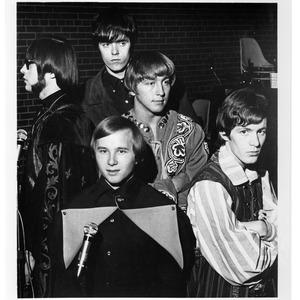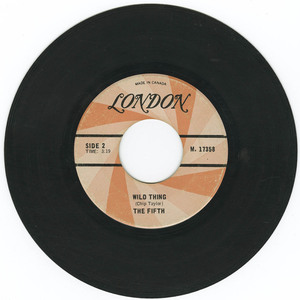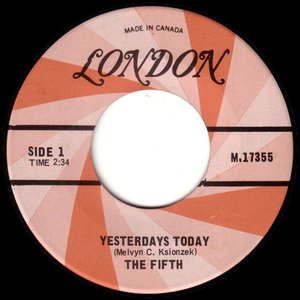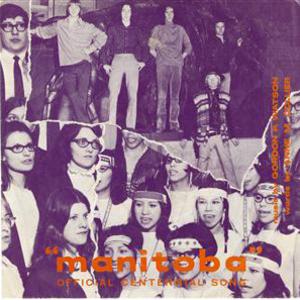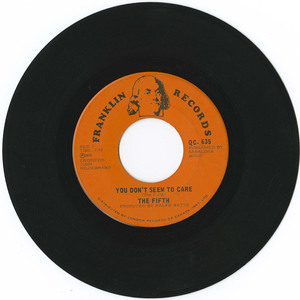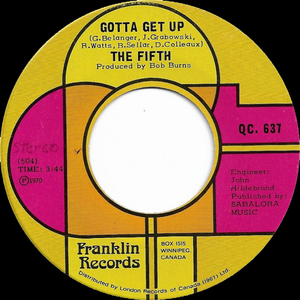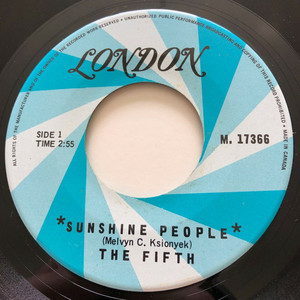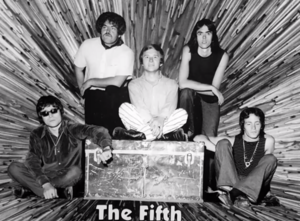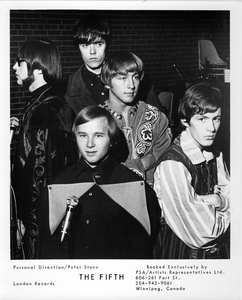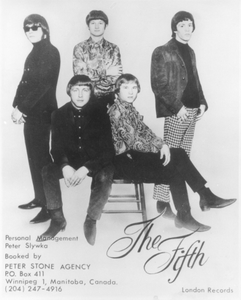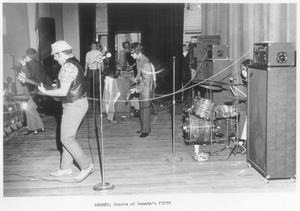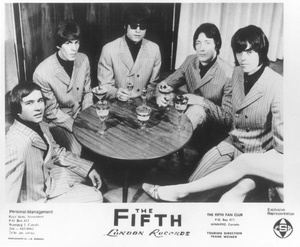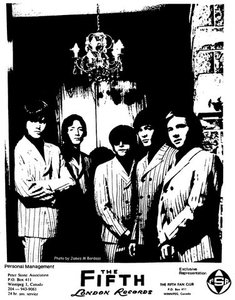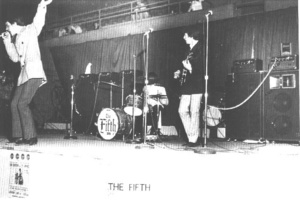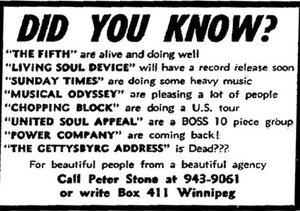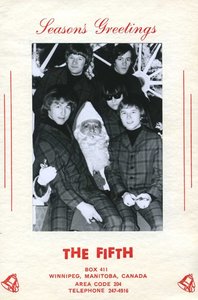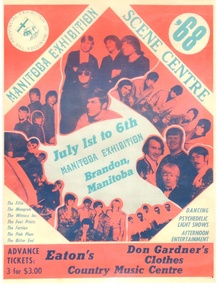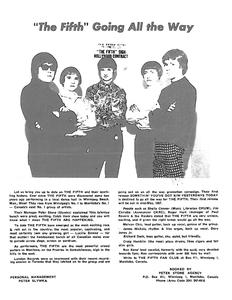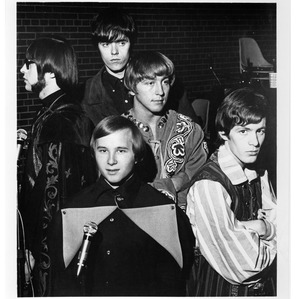Fifth
Websites:
https://www.vancemasters.ca/bands/fifth.html
Origin:
Gimli, Manitoba
Biography:
One of Winnipeg’s hottest acts throughout the late sixties really wasn’t from Winnipeg at all. Its roots lay in the town of Winnipeg Beach and the neighbouring communities of Gimli and Matlock. In 1900, the Canadian Pacific Railway (CPR) purchased 32 acres of undeveloped shoreline 65 kilometres north of Winnipeg on the southwestern shore of Lake Winnipeg and commenced construction of what would become one of western Canada's foremost resort facilities. Back in the early part of the 1900’s, the only way to get to Winnipeg Beach was by train. The railroad built a dance pavilion on the waterfront, and the "Moonlight Special" trains ferried city dwellers out to the fledgling resort for an evening of dance and revelry. By the 1950’s, it was a booming retreat. Short, hot summers on the boardwalk were followed by long months of isolation in the deep of winter. Such was the backdrop for the genesis of The Fifth.
The forerunner of The Fifth was a group called The Saints. All still in high school, they rehearsed in the old Gimli train station and played Interlake regional dances. Starting off as a four-piece in 1964, the original members were:
Richard Gwizdak - bass
Melvyn Ksionzek - drums
Gordon Hucul - guitar
Ron Schmidt - vocals
Summer of 1965, Richard left the band and moved to Winnipeg. He was rehearsing with another collection of musicians for a time, but they never got to the point of actually playing any dates. When they called it quits, Richard co-opted the name they had planned to use, contacted The Saints, and The Fifth came into being.
There was a bit of a change to who was playing what. Gordon Hucul left and was replaced by Melvyn on lead guitar. Barry Zdebiak took Mel's place as drummer. Jimmy Grabowski initially came into the band playing rhythm guitar and organ, replacing Gary Swirski. Richard remained on bass, with Ron Schmidt continuing as their lead singer. And that was the first official lineup of The Fifth.
The band relocated to Winnipeg in 1966 and took up residence in Richard's house in East Kildonan, rehearsing there during the week for what had become a jam-packed schedule of bookings arranged by their manager, Peter Stone (Peter Slywka).
In the fall of 1966, former Quid vocalist Ron René joined the band. The most prestigious community club in Winnipeg at the time was River Heights and when The Fifth was slated to play, huge lineups started at 5:30 in the afternoon. By now, Craig Hamblin had replaced Barry Zdebiak, only to be followed a short time later by Ron Savoie.
The group’s breakout single, Yesterday's Today (b/w Something You've Got), was recorded in Toronto on the London Records label and released May 1967. The song, written by Melvyn, rose to #9 on the local CKRC chart and #93 on the national charts, receiving the Lloyd E. Moffat Award for Best Canadian Produced Rock Recording the following year. Inaugurated in 1967 in memory of Lloyd E. Moffat, Founder of Moffat Communications, the awards were made annually for recordings that best demonstrated Canadian talent and originality.
Four months later, The Fifth recruited Vance to take over the drum chair. While rehearsals with Clayton Square had gone well, they had yet to finalize any gigs. With bands such as The Byrds and Paul Revere and the Raiders now dominating the charts, The Fifth's style began to take on more of an American flavour. The prospect of stepping into a well-established band with a different genre of music was sufficient to entice Vance away from the upstart venture of Clayton Square. Shortly after he joined, Richard left to pursue a career in photography, and Melvyn switched to bass, with Doug Love taking over for Melvyn on lead guitar.
The band toured Western Canada and the northern United States as the opening act for some of the biggest names at the time ... The Beach Boys, The Byrds, Sonny & Cher, The Seeds, Paul Revere & the Raiders, The McCoys, Herman's Hermits, Dino, Desi & Billy. After-show parties at Richard's place often included those performers and were legendary. The Fifth spent so much time on the road - and in so many different places in a short period of time - that on one occasion when questioned by the U.S./Canada border crossing guards as to where they were going, each member of the band answered at the same time … but with a different city!
The Fifth followed up their first release with a second hit, Tears, (b/w Wild Thing). The story is that "after witnessing the Jimi Hendrix Experience's mind-blowing performance at the 1967 Monterey Pop Festival, the Fifth returned home and recorded Hendrix's arrangement of the Troggs' hit Wild Thing"2.
Mid-1968, Kurt Winter became available when the Gettysbyrg Address fell apart. He replaced Doug Love on guitar, and for collectors, Sunshine People is the only Fifth record on which Kurt played.
The Fifth were somewhat pioneers within the recording industry, due primarily to Melvyn Ksionzek. Melvyn’s role in the band went through various incarnations, starting first as the drummer, then moving onto guitar, and finally ending up as their bass player when Richard Gwizdak left the band. Throughout it all, he also spent a substantial portion of his time learning the skill sets being used within the recording industry. He had developed such a proficiency that it became commonplace for him to introduce audio engineers on their recording sessions to methods the technicians hadn’t used before. The Fifth often employed the talents of guest artists such as Canadian Jazz legends Moe Kaufman and Guido Basso to add the finishing touches to their arrangements.
1968 saw the release of two more singles - Sunshine People (b/w Don't Worry About Me Babe) and All I Want is Love (b/w Caprice). By the close of 1968, The Fifth had become one of the most popular and dynamic groups on the Winnipeg music scene, and named one of the top three bands in the city.
The success of the group, however, came with a high price ticket, and shortly after the birth of Vance’s daughter, Krista, his first marriage dissolved. He retained custody of Krista, which led to a curtailment of his performing schedule while he tended to the needs of his infant daughter. By October 4, 1969, Vance, Kurt, and Melvyn had left The Fifth to work with keyboard player Herman Frühm, backing up local artist Lucille Emond in an enterprise that did not entail the rigorous road schedule that had become the norm for The Fifth. The idea for BROTHER began to take shape during this period.
Ron René followed the exodus and by 1970, Jimmy Grabowski was the sole remaining original member. The Fifth discovered they had lost the right to use the name just after they released Tobacco Road. It was owned by their manager, Peter Stone, and when they severed ties with Peter, so went the name. Their first and only album, Dusty Shoes, was released in 1971 under the moniker of Next.
POSTSCRIPT: March 28, 2003
For weeks prior to the show, about the only buzz around town was the Jack Skelly Tribute - Another Teen Dance Party and The Fifth made frequent appearances, both individually and as a group, on Winnipeg's KY-58 Radio to promote the event. The bands on the schedule were a veritable who’s who from the 60’s with Mystery Train, The Pallbearers, The Shondels, Wayne Walker and The All-Stars, Joey Gregorash, and the much-anticipated reunion of the original members of The Fifth. And the audience was not disappointed.
The Fifth took the stage as though the 35 years between performances had just melted away, much to the delight of their fans from the old days, many of who crowded around the stage to get a close up view of the one-time teen idols that dominated the late 60’s music scene in Winnipeg. Playing a mix of their hit records, interspersed with cover tunes of major groups from that era, they launched their set with a medley starting with a Monkee’s song, re-writing the lyrics to change the name to The Fifth. 45 minutes later, The Fifth finished their show with a Beatle’s classic, Sergeant Pepper’s Lonely Heart Clubs Band to thunderous applause which continued until the band was coaxed back on stage for an encore. To those in attendance, it was as if they had been magically transported back to a time when things were so much simpler and music could indeed, at least for a short while, make you forget all the other things happening in the world. Their performance was captured on video tape, and is listed below in the library. Unfortunately, we do not know who provided the footage so have not been able to provide credit the individuals.
